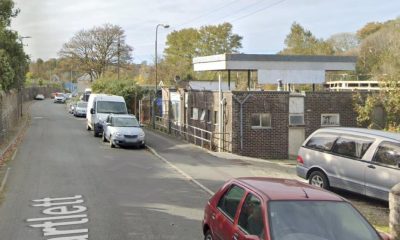News
Sea Empress oil spill: 25 years since Wales’ biggest ecological disaster
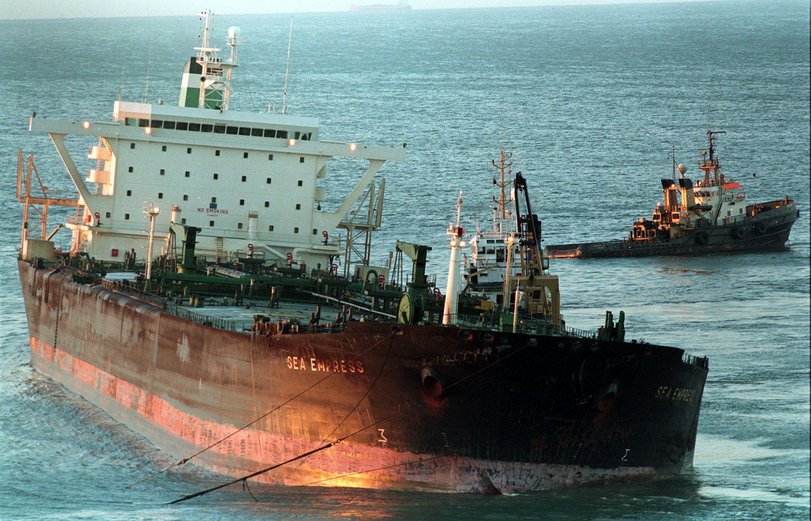
IT’S EXACTLY 25 years since Wales’ worst ecological disaster – single hull oil tanker hit rocks in the middle of the channel, holing her below the waterline.
On 15 February 1996, the Sea Empress oil tanker ran aground as it entered the Milford Haven Waterway.
Six days later, the tanker re-floated and was towed into the harbour. In the days between its grounding and towing, the oil tanker spilled 72,000 tons of crude oil along the Pembrokeshire Coastline, within the Pembrokeshire Coast National Park.
It was a Thursday morning the oil tanker was en route to the Texaco oil refinery when she became grounded on mid-channel rocks at St. Ann’s Head. Over the course of a week, she spilt 72,000 tons of crude oil into the sea. The spill occurred within the Pembrokeshire Coast National Park – one of Europe’s most important and sensitive wildlife and marine conservation areas.
Sailing against the outgoing tide and in calm conditions, at 20:07 GMT the ship was pushed off course by the current and became grounded after hitting rocks in the middle of the channel.
The collision punctured her starboard hull causing oil to pour out into the sea. Tugs from Milford Haven Port Authority were sent to the scene and attempted to pull the vessel free and re-float her. During the initial rescue attempts, she detached several times from the tugs and grounded repeatedly – each time slicing open new sections of her hull and releasing more oil.
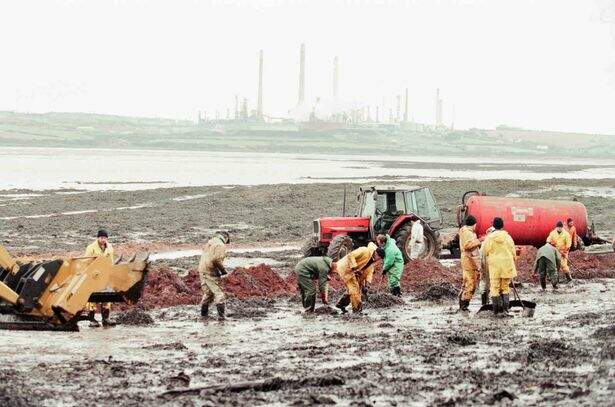
Clean up underway near Dale, Pembrokeshire following the oil spill (Image PA)
RESCUE OPERATION
A full scale emergency plan was activated by the authorities. News of the grounding was first reported at 21:18 on the BBC’s Nine O’Clock News – just over an hour after she ran aground.
Over the next few days, efforts to pull the vessel from the rocks continued.
Assisting the many local vessels, tugboats were drafted in from the ports of Dublin, Liverpool and Plymouth to assist with the salvage operation.
The tanker ran aground very close to the islands of Skomer and Skokholm – both national nature reserves, Sites of Special Scientific Interest (SSSI) and Special Protection Areas and home to Manx shearwaters, Atlantic puffins, guillemots, razorbills, great cormorants, kittiwakes, European storm-petrels, common shags and Eurasian oystercatchers.
Birds at sea were hit hard during the early weeks of the spill, resulting in thousands of deaths. The Pembrokeshire grey seal population didn’t appear to be affected too much and impacts to subtidal wildlife were limited. However, much damage was caused to shorelines affected by bulk oil. Shore seaweeds and invertebrates were killed in large quantities. Mass strandings of cockles and other shellfish occurred on sandy beaches. Rock pool fish were also affected. However, a range of tough shore species were seen to survive exposure to bulk oil and lingering residues.
A rescue centre for oiled birds was set up in Milford Haven. According to the Countryside Council for Wales (CCW), over 70% of released guillemots died within 14 days. Just 3% survived two months and only 1% survived a year.
The Pembrokeshire coast is home to common porpoises and bottlenose dolphins.
The effects of the oil and chemical pollution on these species remains unknown. Significant numbers of both species were recorded in the waters off the Skomer Marine Nature Reserve during the spring and summer of 1996.
The main containment and dispersement of the oil slick at sea was completed within six weeks. However, the removal of oil on shore took over a year until the late spring of 1997. Small amounts of oil were still found beneath the sand on sheltered beaches and in rock pools in 1999 – three years after the spill.
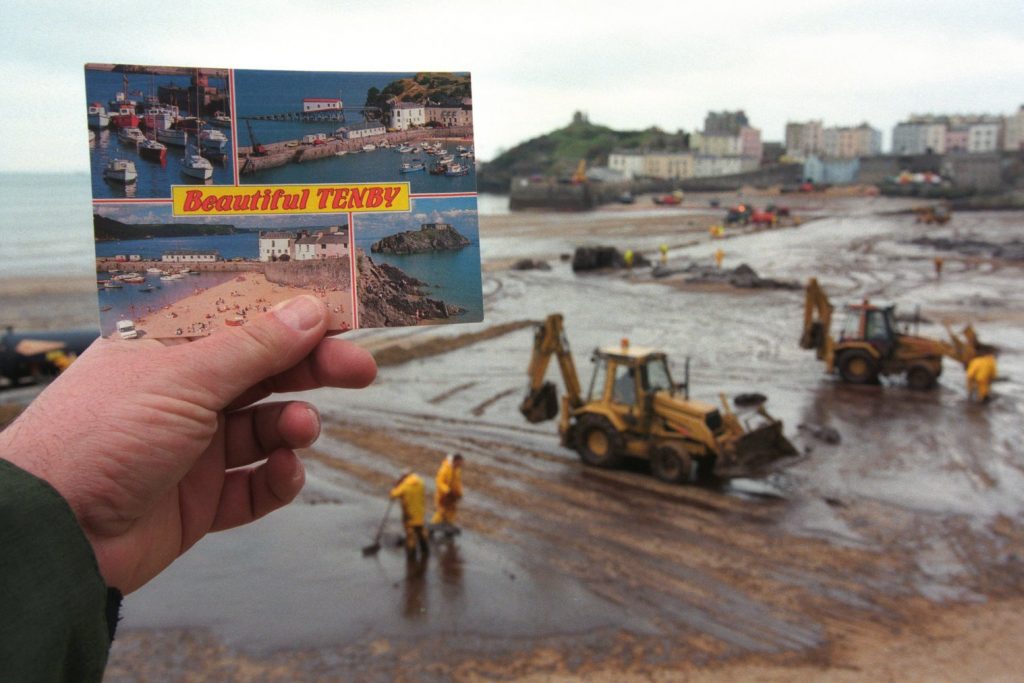
Contractors clean oil from Tenby north beach after the oil tanker Sea Empress ran aground on rocks Pembrokeshire Wales UK (Image: PA)
IT COULD HAVE BEEN WORSE
The effects of the spill were not as bad as initially predicted. This was due in part to the time of year when the spill occurred.
In February, many migratory animals had not yet arrived back in Pembrokeshire for breeding.
Along with stormy weather which helped break-up and naturally disperse the oil, the effect on wildlife would have been much worse if the spill had occurred just a month later.
The spill would undoubtedly have been catastrophic for both the environment and local economy if it had occurred during the summer months.
Much of the Pembrokeshire coastline recovered relatively quickly.
By 2001, the affected marine wildlife population levels had more-or-less returned to normal.
There was an immediate ban on fishing off the coast of Pembrokeshire and south Carmarthenshire which had a devastating impact on the local fishing industry.
The ban remained in place for several months and was lifted in stages.
Many local fishermen received financial compensation for the loss of income due to the ban.
The spill occurred just a few weeks before the Easter break when many holidaymakers would be visiting the area.
Some sheltered beaches and tidal estuaries were still covered with oil, but the main tourist locations of Tenby, Saundersfoot, Pendine, Manorbier and Bosherston were superficially cleaned.
A large clean-up operation began as soon as the Sea Empress started spilling oil.
Volunteers and paid hands alike, came together to restore the beautiful beaches of Pembrokeshire.
In the immediate days and weeks that followed, one thousand people worked around the clock to rescue oiled birds and remove oil from beaches using suction tankers, pressure washers and oil-absorbing scrubbers.
The main clean-up operation lasted several weeks and continued on a reduced scale for over a year.
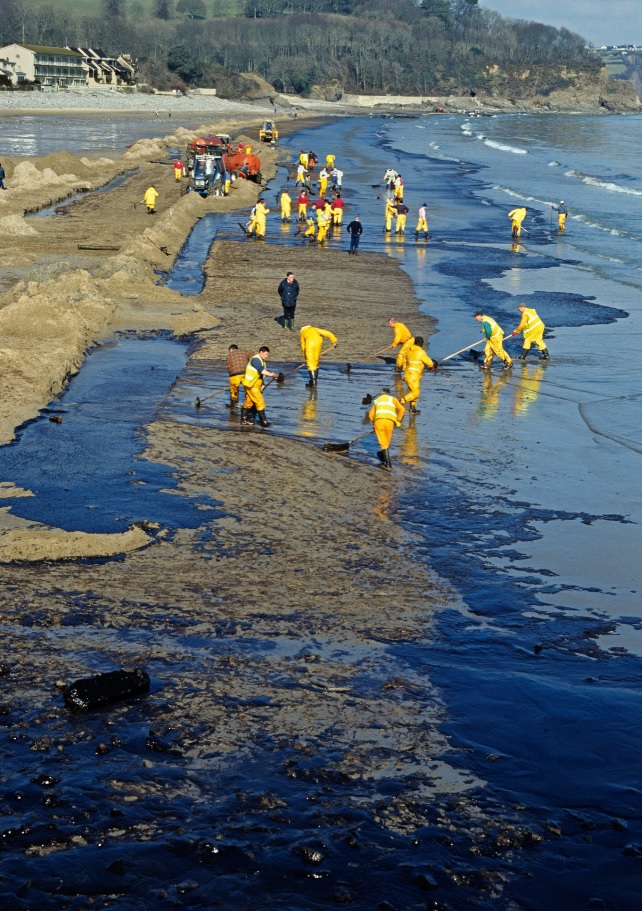
Workmen clean up the spill in Tenby (Image PA)
PORT AUTHORITY FINED £4 MILLION
Almost three years after the spill in January 1999, Milford Haven Port Authority (MHPA) was fined a record £4m after pleading guilty to the offence of causing pollution under the Water Resources Act 1991. The MHPA was also required to pay a further £825,000 prosecution costs by agreement.
The cost of the clean-up operation was estimated to be £60m. When the effects to the economy and environment are taken into account, the final cost is estimated to have been twice that, at £120m.
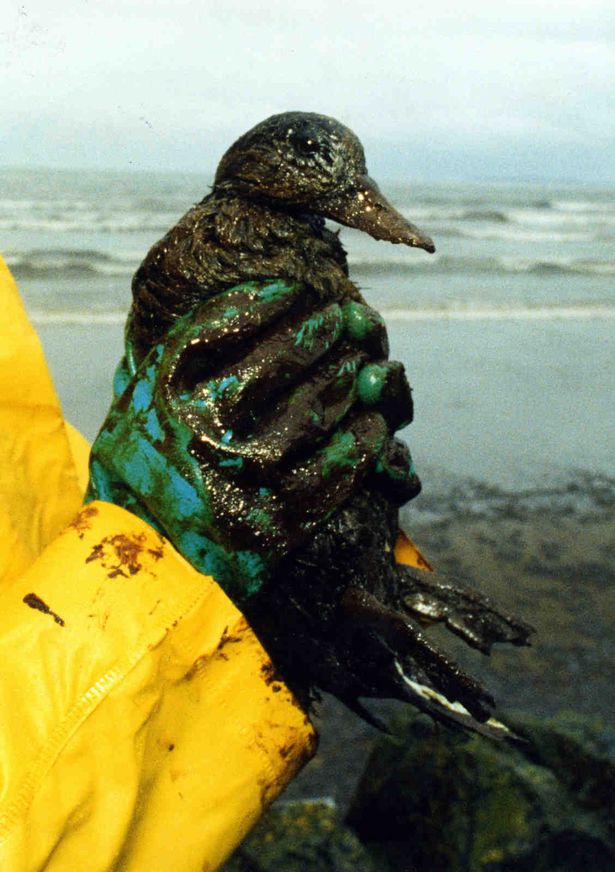
Oiled seabird rescued for cleaning (Image: File)
SHIPS BAD LUCK CONTINUES
While the cause of the initial grounding was found to be due to pilot error, it seems the vessel, even under new ownership, could not escape her run of bad luck. While attempting to dock for scrapping in Bangladesh she was ruptured again, this time by a sunken vessel.
She was renamed a further four times before her final demise, known as MV Front Spirit for a while before being sold under the name MV Ocean Opal, to Chinese buyers.
They used her as a floating storage and offloading unit from 2004. In 2010, she was converted in Shanghai into a bulk carrier, and re-flagged as the Panamanian registered MV Welwind. In 2012, she was renamed for a fifth time: MV Wind 3 and on June 3 that year the 274-metre long vessel was brought to Chittagong in Bangladesh for dismantling at the Shitakunda ship breaking yard.
On the way to the yard the ship developed a crack in one side of its engine room following a collision with a sunken ship, Hang Ro Bong, when she was attempting to anchor at the B (Bravo) anchorage of the port.
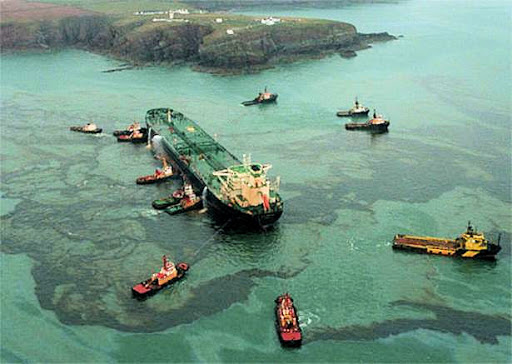
The view from above: The scale of the operation unfolds (Image: Herald archive/MCA)
LESSONS NOT LEARNED
In 2016 former local MP Nick Ainger said that the lessons from the disaster had not been learned
He told BBC Radio Wales’ Sunday Supplement programme that the scrapping of the UK’s emergency towing vessel fleet showed lessons had not been learned 20 years on- The Maritime and Coastguard Agency (MCA) said it was felt the shipping industry should fund such a service.
Mr Ainger said: “We now have a position, 20 years after the Sea Empress, 23 after the Braer, where we have no emergency towing vehicles stationed around our coast.
“Ironically, other countries in Europe, in Spain, in France, Germany, Norway have got government-financed emergency towing vessels.
“We, with our huge coastline with all the shipping that we have coming not only in and out of Milford Haven, but around our shores from the North Sea carrying crude oil, we haven’t got a government-supported emergency towing vessel.
“I think that lesson should be re-learned very, very quickly before we have another disaster.”
An MCA spokeswoman said: “The government believes that responsibility for ensuring the operational safety of ships is properly a matter for the commercial shipping industry, working in partnership with the tug and salvage industries; it did not believe that it was appropriate for the taxpayer to fund this provision.”
She added that no vessel had run aground or foundered in UK waters, nor had any pollution occurred, as a result of a ship being unable to engage a suitable towing vessel.
Following the Sea Empress disaster towing regulations in the Milford Haven waterway were tightened. Following the lead from a Scottish oil terminal, Sullom Voe, ‘escort towing’ was started. Cory Towage sent a representative to Shetland to observe and report back.
At the time the Sea Empress went aground this practice had already started in the Solent for the Port of Southampton, If Milford Haven had done the same in time, the disaster would certainly not have occurred.
Further reading: The Sea Empress’s second accident
News
Paris in February made easy with special direct Air France flights from Cardiff

TRAVELLING to Paris has never been simpler for Welsh holidaymakers, with Air France launching a series of special direct weekend services from Cardiff Airport to the French capital this month.
The limited-period flights offer a convenient, non-stop journey of under two hours to Paris, giving passengers more time to enjoy the city’s culture, cuisine and famous landmarks without the hassle of connections or long road transfers to other UK airports.

Timed perfectly for winter city breaks and Valentine’s getaways, the services run between February 13 and February 16, making them ideal for long weekends.
February is widely considered one of the best times to visit the French capital, with fewer crowds and a relaxed, romantic atmosphere. Visitors can explore world-famous attractions including the Eiffel Tower, the Arc de Triomphe and Notre-Dame Cathedral, browse galleries at the Louvre and Musée d’Orsay, or simply enjoy cafés, bistros and Michelin-starred dining across the city.
With Valentine’s Day falling during the operating period, the flights offer couples an easy escape for scenic walks along the Seine, memorable meals and classic Parisian experiences.
Jon Bridge, CEO of Cardiff Airport, said: “We’re delighted to offer direct flights to such a vibrant city for Valentine’s weekend. Cardiff Airport is expanding its reach, giving customers an easy, friendly travel experience and fantastic options. We’ve listened to passenger demand and are excited to make this opportunity possible, with more to come from Cardiff.”
Seats are available now via airfrance.co.uk and through travel agents. As availability is limited, early booking is recommended.
Flight schedule
Cardiff (CWL) to Paris (CDG)
• Feb 13 – AF4149 – 6:20pm → 8:50pm
• Feb 14 – AF4149 – 3:20pm → 5:50pm
• Feb 15 – AF4149 – 9:20am → 11:50am
• Feb 15 – AF4151 – 9:00pm → 11:30pm
• Feb 16 – AF4149 – 9:20am → 11:50am
• Feb 16 – AF4151 – 5:50pm → 8:20pm
Paris (CDG) to Cardiff (CWL)
• Feb 13 – AF4148 – 5:00pm → 5:30pm
• Feb 14 – AF4148 – 2:00pm → 2:30pm
• Feb 15 – AF4148 – 8:00am → 8:30am
• Feb 15 – AF4150 – 7:40pm → 8:10pm
• Feb 16 – AF4148 – 8:00am → 8:30am
• Feb 16 – AF4150 – 4:30pm → 5:00pm
Education
Language commissioner launches probe into school closure impact on Welsh

THE WELSH Language Commissioner has launched a formal investigation into claims that the proposed closure of a rural Carmarthenshire primary school did not properly assess the impact on the Welsh language.
Campaign group Cymdeithas yr Iaith confirmed this week that the Welsh Language Commissioner will examine whether Carmarthenshire County Council complied with its legal duties when producing a language impact assessment linked to plans to close Ysgol Llansteffan.
The council issued a statutory notice last year proposing to shut the village school at the end of the summer term as part of wider education reorganisation. A final decision had been expected this spring.
However, the investigation now creates fresh uncertainty over the timetable.

Complaint over ‘insufficient assessment’
Cymdeithas yr Iaith says it submitted a formal complaint arguing that the council failed to produce a sufficiently detailed assessment of how the closure could affect Welsh-medium education and the wider Welsh-speaking community.
The group claims the authority selectively used data to support closure rather than examining all available evidence objectively.
Two key concerns were raised.
Firstly, campaigners argue there may not be enough places in neighbouring Welsh-medium schools to accommodate pupils from Llansteffan and nearby housing developments, potentially forcing some families into English-medium provision.
Secondly, they say the assessment did not meaningfully consider the school’s role as a community hub or explore ways the site could generate income and support local Welsh-language activities.
On behalf of local members, Ffred Ffransis said: “There will not be places for all the Llansteffan children, nor for the children of the new housing estates, in other Welsh-medium schools in the area.
“The most cost-effective way of providing sufficient places locally in Welsh-medium education is by keeping open Ysgol Llansteffan and making better use of the buildings, including environmental education and community use.”
Formal investigation
In a letter to the group, the commissioner confirmed an investigation will be held under Section 71 of the Welsh Language Measure to determine whether the council complied with Welsh language standards.
The probe could take up to three months.
Campaigners believe this may delay implementation of the closure and could require the council to revisit its assessment and potentially carry out a fresh statutory consultation.
Ffransis said: “Even if the council now decided to make a full and meaningful assessment, there would likely have to be a new consultation. The original decision may have been taken on a faulty basis.”
He added that similar concerns had been raised about language impact assessments connected to other proposed school closures in the county.
Council position
The council has previously said that school reorganisation proposals are driven by falling pupil numbers, financial pressures and the need to ensure sustainable, high-quality education.
Authorities across Wales have faced difficult decisions in recent years as rural rolls decline and building maintenance costs rise.
It is expected the council will respond formally to the commissioner’s investigation in due course.
What happens next
If the commissioner finds that language standards were not properly followed, enforcement steps could be taken and the process delayed or revisited.
For families in Llansteffan, the outcome may determine whether their local Welsh-medium school remains open beyond the summer term.
The Herald has contacted Carmarthenshire County Council for comment.
Further updates will follow as the investigation progresses.
Business
First Minister criticised after ‘Netflix’ comment on struggling high streets

Government announces 15% support package but campaigners say costs still crushing hospitality
PUBS, cafés and restaurants across Wales will receive extra business rates relief — but ministers are facing criticism after comments suggesting people staying home watching Netflix are partly to blame for struggling high streets.
The Welsh Government has announced a 15% business rates discount for around 4,400 hospitality businesses in 2026-27, backed by up to £8 million in funding.
Announcing the package, Welsh Government Finance Secretary Mark Drakeford said: “Pubs, restaurants, cafés, bars, and live music venues are at the heart of communities across Wales. We know they are facing real pressures, from rising costs to changing consumer habits.
“This additional support will help around 4,400 businesses as they adapt to these challenges.”
The announcement came hours after Eluned Morgan suggested in Senedd discussions that changing lifestyles — including more time spent at home on streaming services — were contributing to falling footfall in town centres.
The remarks prompted political backlash.
Leader of the Welsh Liberal Democrats, Jane Dodds, said: “People are not willingly choosing Netflix over the high street. They are being forced indoors because prices keep rising and wages are not.
“Blaming people for staying at home is an insult to business owners who are working longer hours just to survive.”
Industry groups say the problem runs deeper than consumer behaviour.
The Campaign for Real Ale (CAMRA) welcomed the discount but warned it would not prevent closures.
Chris Charters, CAMRA Wales director, said: “15% off for a year is only the start. It won’t fix the unfair business rates system our pubs are being crushed by.
“Welsh publicans need a permanent solution, or doors will continue to close.”
Across Pembrokeshire, traders have repeatedly told The Herald that rising energy bills, wage pressures and rates — rather than a lack of willingness to go out — are keeping customers away.
Several town centres have seen growing numbers of empty units over the past year, with independent shops and hospitality venues reporting reduced footfall outside the main tourist season.
While ministers say the relief balances support with tight public finances, business groups are calling for wider and longer-term reform.
Further debate on rates changes is expected later this year.

-

 Health6 days ago
Health6 days agoConsultation reveals lack of public trust in health board
-

 News7 days ago
News7 days agoCaldey still unsafe, survivors warn — despite Abbey’s reform claims
-

 Community7 days ago
Community7 days agoPembrokeshire students speak at national Holocaust Memorial Day event
-

 News18 hours ago
News18 hours agoPrincess of Wales visits historic Pembrokeshire woollen mill
-

 News7 days ago
News7 days agoKurtz raises Gumfreston flooding in the Senedd as petition deadline nears
-

 Crime5 days ago
Crime5 days agoPembroke man accused of child sex offences sent to Swansea Crown Court
-

 Education7 days ago
Education7 days ago‘Vulnerable teen’ questioned by police at Milford Haven School
-

 Education7 days ago
Education7 days agoAttendance concerns at Milford School reflect wider issue raised at the Senedd







